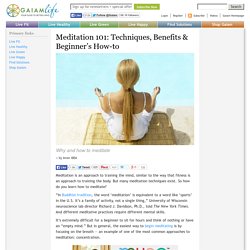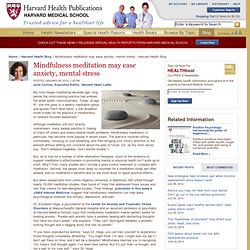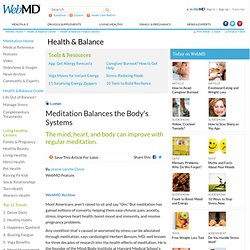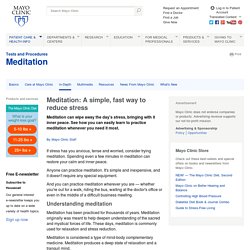

How to Meditate: Meditation Techniques, Benefits & Beginner's How-to. Meditation is an approach to training the mind, similar to the way that fitness is an approach to training the body.

But many meditation techniques exist. So how do you learn how to meditate? “In Buddhist tradition, the word ‘meditation’ is equivalent to a word like ‘sports’ in the U.S. It’s a family of activity, not a single thing,” University of Wisconsin neuroscience lab director Richard J. Davidson, Ph.D., told The New York Times. It’s extremely difficult for a beginner to sit for hours and think of nothing or have an “empty mind.”
Taking a Closer Look at Health Benefits of Meditation. Meditation research has come a long way since the first scientific study on meditation was published in a peer-reviewed journal in 1971 [1].

That study declared the discovery of a major fourth state of consciousness— the state of restful alertness — experienced during the Transcendental Meditation (TM) technique. Now there are over 1,000 published studies on various meditation practices, with over 600 studies on the TM technique alone. Many universities, medical schools and hospitals offer classes in mind-body medicine and provide training in meditation. Nevertheless, recent press reports about a scientific review [2] published in JAMA Internal Medicine (January 2014) raised questions about the extent of health benefits that can be claimed for meditation. “Many doctors and scientists are recognizing that mind-body-heart research has crossed a threshold,” says Dr. Recent medical schools and hospitals to host Dr. High-profile doctors Mehmet Oz, the Discovery Channel’s Dr. Mindfulness meditation may ease anxiety, mental stress. My mom began meditating decades ago, long before the mind-calming practice had entered the wider public consciousness.

Today, at age 81, she still goes to a weekly meditation group and quotes Thich Nhat Hanh, a Zen Buddhist monk known for his practice of mindfulness, or “present-focused awareness.” Although meditation still isn’t exactly mainstream, many people practice it, hoping to stave off stress and stress-related health problems. Mindfulness meditation, in particular, has become more popular in recent years. The practice involves sitting comfortably, focusing on your breathing, and then bringing your mind’s attention to the present without drifting into concerns about the past or future. (Or, as my mom would say, “Don’t rehearse tragedies. But, as is true for a number of other alternative therapies, much of the evidence to support meditation’s effectiveness in promoting mental or physical health isn’t quite up to snuff.
Dr. “If you have unproductive worries,” says Dr. Meditation Balances the Body's Systems. The mind, heart, and body can improve with regular meditation.

Why do I need to register or sign in for WebMD to save? We will provide you with a dropdown of all your saved articles when you are registered and signed in. WebMD Archive Most Americans aren't raised to sit and say "Om. " Meditation Health Benefits: What The Practice Does To Your Body. We hear it all the time: Meditation can improve our creative thinking, our energy, stress levels and even our success.

Prominent artists, businessmen and politicians cop to the practice. Would it work for you? "It did to my mind what going to the gym did to my body -- it made it both stronger and more flexible," said Dr. Hedy Kober, a neuroscientist who who studies the effects of mindfulness meditation, which she has practiced for 10 years, at her lab at Yale University. She admitted during a TED Talk that she started meditating to deal with a break up, but found that it helped her handle stress and unpleasant feelings in all areas of her life. Studies show that meditation is associated with improvement in a variety of psychological areas, including stress, anxiety, addiction, depression, eating disorders and cognitive function, among others. For one thing, it changes our brain. "Think of the end of a neuron as a hand, with thousands of 'fingers,'" said Dr.
Want to learn more? Meditation: Take a stress-reduction break wherever you are. Meditation: A simple, fast way to reduce stress Meditation can wipe away the day's stress, bringing with it inner peace.

See how you can easily learn to practice meditation whenever you need it most. By Mayo Clinic Staff If stress has you anxious, tense and worried, consider trying meditation. Spending even a few minutes in meditation can restore your calm and inner peace. Anyone can practice meditation. And you can practice meditation wherever you are — whether you're out for a walk, riding the bus, waiting at the doctor's office or even in the middle of a difficult business meeting. Understanding meditation Meditation has been practiced for thousands of years.
Meditation is considered a type of mind-body complementary medicine. During meditation, you focus your attention and eliminate the stream of jumbled thoughts that may be crowding your mind and causing stress. Benefits of meditation And these benefits don't end when your meditation session ends.